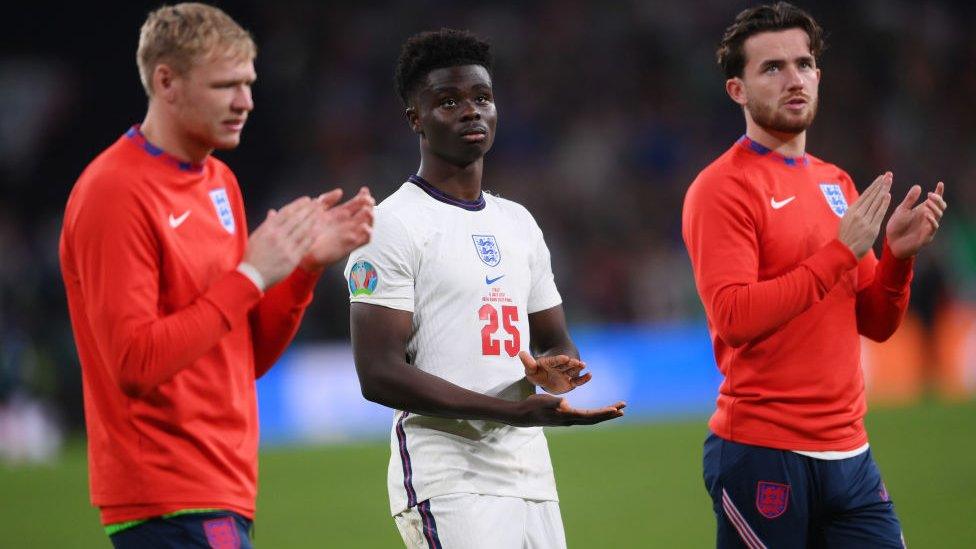Instagram: Changes aim to tackle abuse online after Euro 2020 final racism
- Published
- comments

Bukayo Saka received racist abuse online, along with his teammates Marcus Rashford and Jadon Sancho
Instagram has announced a range of new tools it says will help protect users and do more to combat abusive and racist behaviour online.
The changes come a month after England players including Marcus Rashford, Bukayo Saka and Jadon Sancho were racially abused online after the Euro 2020 final.
The racist attacks directed at the football players are part of an increasing trend of online abuse over recent years, and there have long been calls for social media companies to do more to stop it.
Earlier this year, both Facebook (who own Instagram) and Twitter said they were acting to remove abuse on their platforms.
But after the racist abuse that followed the Euros, social media companies faced fresh pressure to act to stamp it out.
Prime Minister Boris Johnson said companies like Facebook and Twitter needed to "up their game to prevent online abuse now".
Jadon Sancho (left) and Marcus Rashford (right) were brought on in extra time during the Euro final
In July, Facebook admitted it had made a mistake when it came to moderating the abuse, and promised to take a closer look at its software systems.
Instagram now said it wants to better protect people from seeing abusive content, whether it's racist, sexist, homophobic or any other type of abuse.
Racism: where someone treats another person differently because their racial or ethnic background
Sexism: where someone treats another person differently because of their gender.
Homophobia: where someone treats another differently because of their sexuality (for example, for being gay).
So what are Instagram's new tools to stop abuse?
The company say the new tools will give people more control and allow them to feel safe when using the site.
Here are new features that Instagram think will help tackle abuse online:
Limits
This new feature will let people decide if they want to automatically hide comments and direct message requests from people they do not already follow.
They can also stop people who only started following them in the last week from messaging them.
In the future, Instagram users could even be asked if they want to turn on Limits when they seem to be getting a lot of comments and direct messages out of nowhere.
This is something which is designed to stop lots of people coming online with the intention of targeting and bullying an individual.
Tom Gault, from Instagram, said this can often happen to public figures, who see a sudden spike in targeted comments and message requests after a certain events.
Warnings
Instagram has also increased the level of in-app warnings it gives when a user is posting an abusive message.
The warning tells users they could have their account removed if they continue to send abusive comments.
Hidden Words filter
This gives people the option filter out words, phrases and emojis they don't want to see.
Instagram boss Adam Mosseri said: "We know there's more to do, including improving our systems to find and remove abusive content more quickly, and holding those who post it accountable."
Have other platforms been making similar changes?
Twitter is another platform that many people used to make racist comments after England lost the Euro 2020 final.
The social media platform has said it removed 1,622 offensive tweets in 24 hours and was working to introduce new features, which include using automated tools to help remove messages quickly.
The company also said it would soon be testing a new feature that temporarily autoblocks accounts using harmful language.
Is enough being done to stop online abuse?
Facebook, Instagram, TikTok, YouTube and Twitter are all self-regulated - which means they set their own rules about what is and isn't acceptable on their platforms - but that's about to change in the UK because of something called the Online Safety Bill.
Once the Bill becomes law, it will mean the government has the power to issue huge fines to social media companies that fail to remove harmful or upsetting material.
Oliver Dowden, the Culture Secretary, said: "Social media companies need to up their game in addressing it and, if they fail to, our new Online Safety Bill will hold them to account."
However, critics say that lots of delays to the Bill have left users vulnerable to the kind of abuse experienced by the England players after the final.
Jo Stevens, shadow culture secretary for the opposition Labour Party, said: "Social media platforms have had more than enough opportunities to sort this out."
She also added that the Bill doesn't go far enough and should include very serious punishments for social media bosses who fail to enforce the rules.
- Published12 July 2021
- Published17 February 2021
- Published19 March 2021
